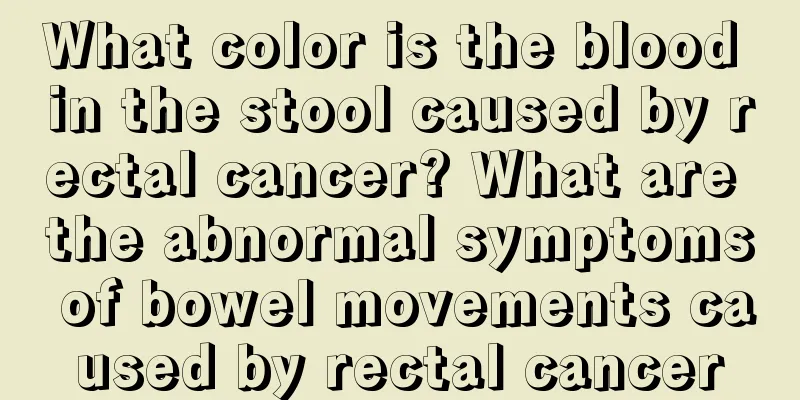What color is the blood in the stool caused by rectal cancer? What are the abnormal symptoms of bowel movements caused by rectal cancer

|
The most obvious symptom of rectal cancer is bleeding in the stool, but the bleeding of rectal cancer is different from hemorrhoid bleeding, and patients need to carefully distinguish them to avoid delaying the best treatment time. What color is the blood in the stool of rectal cancer? What color is the blood in the stool caused by rectal cancer? When the tumor invades the mucosa, the amount of bleeding is generally small, and it mainly appears dark red or bright red. The blood covers the back surface. The bleeding is indirect and not easy to attract people's attention. It is often thought to be caused by hemorrhoids. The color of blood in the stool of rectal cancer is dark red, and it often adheres to the stool. It is also accompanied by an increased frequency of bowel movements and a feeling of falling in the anus. In other words, the feces discharged by the patient contains pus and blood. The blood looks relatively thin. If it is pus and blood in the stool or bloody stool containing mucus, it should be a manifestation of rectal cancer. What are the symptoms of rectal cancer? 1. Long-term constipation Long-term constipation can also cause stool to remain in the body, resulting in higher and higher concentrations of carcinogens. If the colon wall is in contact with these carcinogens for a long time, it will slowly turn into rectal cancer or colon cancer. Changes in bowel habits If your bowel movements are usually dry but suddenly become very loose, or if your very loose stools become very dry, your bowel movement habits may also become abnormal, from once a day to twice or three times a day. 2. Abdominal pain 20% of patients with rectal cancer will experience abdominal pain in the early stages. This is because the upper rectum becomes narrow and intestinal obstruction occurs, resulting in paroxysmal abdominal pain accompanied by abdominal distension, bowel sounds, loose and soft stools, and reduced anal flatus. These conditions can only be relieved or disappear after defecation. 3. Feeling of heaviness and swelling in the perineum When the rectal cancer tumor grows larger or invades the surrounding tissues, it is often accompanied by a feeling of heaviness in the perineum, a feeling of incomplete defecation, and a falling anus. A large amount of secretions will flow out of the anus, and there will be pus and blood. How to prevent rectal cancer? 1. Pay attention to diversity in diet and develop good eating habits. Do not be picky or partial in food. Do not drink high-protein and high-fat foods for a long time. Eat more fresh vegetables and fruits containing dietary fiber and vitamins. This can better prevent rectal cancer. 2. Develop a good habit of regular bowel movements to prevent constipation. Actively treat anal fissures, anal fistulas, rectal polyps and chronic intestinal inflammation. Once rectal cancer is discovered, you should choose a regular hospital for surgical removal in time to prevent cancer. Kind tips In daily life, you should pay attention to dietary conditioning, balance coarse and fine foods, eat more fresh vegetables and fruits, drink plenty of water, do proper exercise, promote gastrointestinal motility, and maintain a good habit of regular bowel movements. You should drink a glass of warm water after waking up every morning to eliminate stool. |
>>: What are the causes of rectal cancer? Can rectal cancer be cured in its early stages?
Recommend
How to prevent eye diseases?
Eyes are known as the windows to the soul and are...
How long does systemic lupus erythematosus last?
For patients with systemic lupus erythematosus, d...
What are the symptoms of advanced lung cancer
The symptoms of advanced lung cancer before death...
Reasons for frequent loose stools
With the continuous development of society, many ...
Is primary gallbladder cancer contagious?
Is gallbladder cancer contagious? Experts say tha...
What causes dental neuralgia
Whether it is gingivitis or periodontitis, when w...
What are the early symptoms of lung cancer? 3 early symptoms of lung cancer Early detection and early treatment
Cancer is a very harmful disease that can cause d...
How many types of oolong tea are there
Speaking of tea, everyone should be familiar with...
What are the steps of facial care?
Face is very important to people, because no matt...
Tips on how to get rid of scratches immediately
In daily life, it is inevitable to get bruises an...
Sequelae of returning from the plateau
Most of us now live in relatively low-lying areas...
Is Chinese medicine useful for premature ejaculation
If a man always suffers from premature ejaculatio...
Normal heart rate value
Measuring heart rate is the most direct way to ju...
Is it okay to sleep without drawing the curtains at night?
Many people have a habit of drawing all the curta...
How to diagnose hamartoma
Many people are afraid of hamartomas, which can c...









